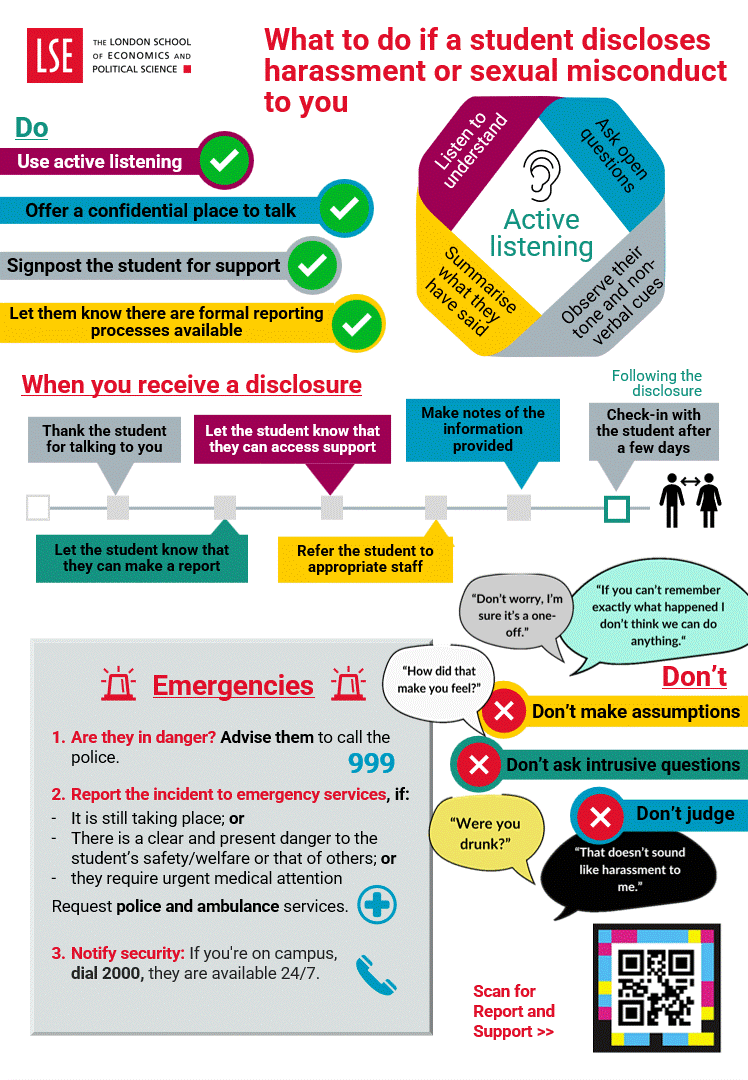The fact that the student/staff member has chosen to disclose to you is likely to imply they trust you. Listen, believe and take the disclosure seriously. Reassure them that they are not alone and that they deserve support.
When responding to a disclosure you should:
1. Create a safe environment
Find a safe and confidential space where you will not be interrupted.
2. Explain confidentiality
Other members of the LSE community, family, friends, accommodation providers and employers will not be informed without consent unless there is a particular safety or welfare concern.
Where there is a safety or welfare concern, you should discuss this with the student/staff member and explain which steps you propose taking. The student/staff member should be kept up to date on any steps taken.
Actions may include:
In cases where there is a clear and present risk of harm, you can escalate without consent for example, if they or others are still in danger – i.e. at risk from the attacker or themselves – or if they need medical attention.
In an emergency you can contact security staff who can make the area safe and call 999 for an ambulance and the police. You should remain present with the student/staff member at least until other specialist, trained support staff from LSE or other appropriate agencies are present.
3. Listen
You should always adopt a non-judgemental approach and do not pressure them to disclose any information or anticipate what the incident(s) involved. Try to be led by them, rather than asking lots of questions. When you do ask questions, these should be focused on safety, clarification, or open ended.
For example:
- ‘Do you feel safe at this time?’
- ‘Would you like to hear about report + support options here within the school?
When speaking with victims/survivors, it can be useful to use empowering language to help them regain a sense of control over next steps. For example, reminding them that they have a choice in what happens now.
4. Provide support options
Provide information to the student/staff member about available support resources internal and external to LSE:
In cases of recent sexual assault and rape, you should advise the student/staff member about immediate support. A guidance note can be found here: Guidance for recent sexual assault and rape - Report + Support - LSE.
You can support the student/staff member to take any initial steps to contact support services.
5. Explain reporting options
You can let the student/staff member know that there are various pathways to report including reporting to LSE (anonymously or with contact details) and the police.
To explore reporting pathways please see here: How to report an incident online
You are there to listen and signpost, you should not give your opinion on what reporting or support route they should take.
The student/staff member should be reassured that reporting is their choice, and their support options are not affected by whether they want to report.
6. Record
You should record a brief, factual, objective and non-judgemental note of what has been shared with you, as well as any actions that you have taken in response to the disclosure. This should be shared with the student/staff member to ensure it is accurate.
Retain your notes with strict adherence to LSE’s Data Protection Policy: datProPol.pdf.
This record is confidential and should only be shared with other members of the School where you have consent from the student/staff member.
If you have a question relating to this record, you should seek advice from LSE’s Data Protection Officer: glpd.info.rights@lse.ac.uk.
7. Follow-up
You should complete any referrals for support services as agreed with the student/ staff member.
Send a follow up email with any signposting and share what notes you retained from the meeting.
If the student/staff member has not or does not intend use LSE’s Report + Support online reporting tool, you can ask for their consent to put through a report (anonymous or otherwise) on their behalf, only sharing what they are comfortable with. This helps the school understand what is happening on our campus and ensures we can take targeted interventions where needed. (e.g. increase security, implement training) To make a report on behalf of someone else, please see here: How to report an incident online.
Support for you
Cases can be complex and it is normal to want reassurance on your response. If you wish to seek advice and support at any time, you can contact the Deputy Head of Student Services (p.evanson@lse.ac.uk ), Harassment and Sexual Misconduct Policy Adviser (h.williams7@lse.ac.uk), your relevant HR partner or Legal team. Even when you don’t have consent to share, you can seek support without providing identifiable information.
It can often be difficult to hear disclosures of violence/harassment. It is important to look after yourself after you receive a disclosure. Ensure, you also familiarise yourself with all the available support.
Support for students / Support for staff
Staff Training on Disclosures
All staff at LSE are expected to complete an online training module on Harassment and Sexual Misconduct, which helps raise awareness of the issues facing our community and provides information on handling disclosures.
Staff training can be found on the My Staff Development system. Access the staff training module on Harassment and Sexual Misconduct here: Addressing Harassment and Sexual Misconduct Affecting Students in Higher Education
